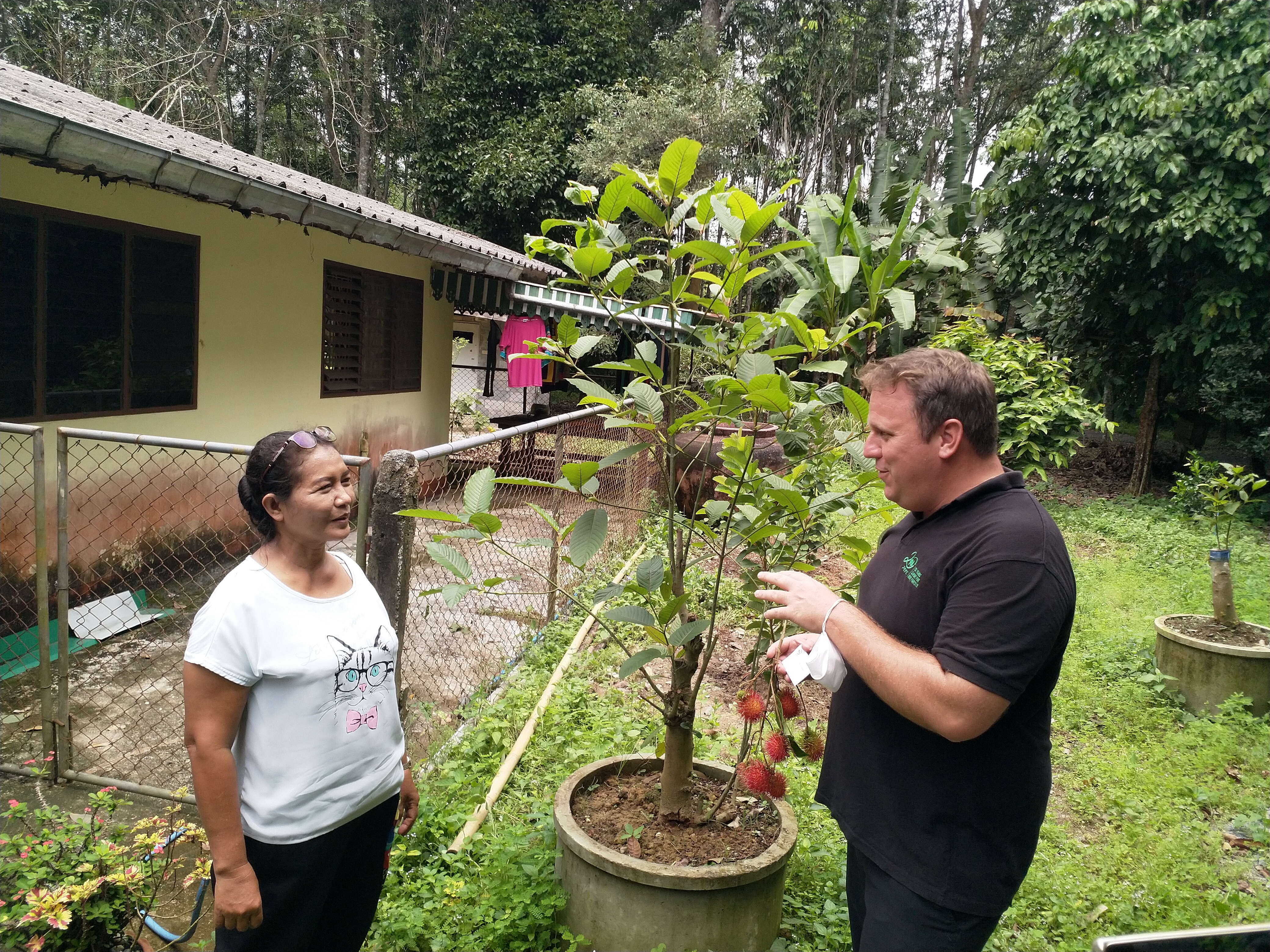Smallholders. Big dreams.
A day in the life of a typical rubber smallholder in Thailand. Helping smallholders like Aree Khwandee overcome challenges and access markets are what motivate PEFC, every day.
Smallholders. Big dreams.
2 August 2022 News
A day in the life of a typical rubber smallholder in Thailand. Helping smallholders like Aree Khwandee overcome challenges and access markets are what motivate PEFC, every day.
At work among the trees

Aree Khwandee’s day starts when most of us are still sleeping. Like millions of other smallholders throughout Southeast Asia, she leaves her home after midnight and heads into her small plantation of rubber trees. A head torch lights her way in the dark, but the night has its benefits. The weather is cooler at this hour, and more forgiving on the hard manual labour that forms the core of Aree’s workday.
And so, with her lamp on, Aree begins peeling back delicately the bark of her trees and hanging buckets to catch the latex as it flows. The natural latex, flowing beneath the bark of her rubber trees, also flows more freely. Some time in the future, a runner in England will slip on their shoes, having no idea that the rubber components in their soles started out here, on Aree’s plantation, in the middle of the night. A shopper in Australia will load their groceries into their car and drive back home on tyres that have this latex in them. A doctor in Japan will administer a vaccine, pushing down on a rubber plunger that was once creamy white latex, collecting slowly into one of Aree’s buckets.
Aree Khwandee’s contribution may be invisible to many of us, but it is smallholders like her who make so many of our modern products and conveniences possible. And while no two rubber smallholders are the same, the challenges that Aree faces and the dreams that she holds for the future are shared by millions of other small scale landowners. PEFC is committed to elevating the stories and the livelihoods of smallholders like Aree, and providing them with an attainable path to sustainability certification.
The challenges faced by smallholders
Aree Khwandee harvests her rubber in Trang province, Thailand. At 55 years old, she has been working as a rubber tapper and later a rubber smallholder for her entire life. And while her plantation is small - just over 1 hectare in size - that puts her on par with millions of other smallholders throughout the region.
Most of the world’s rubber, about 85%, comes from smallholders just like Aree, in Southeast Asia. Few of them own more than a few hectares, and as small actors in a massive global supply chain, that can make them vulnerable to price fluctuations and other market forces. The work is also physically demanding, and as the market transitions towards sustainable sourcing, independent smallholders like Aree are finding that they lack the resources and knowledge required to obtain certification for their plantations. In light of these challenges, Aree and other smallholders like her are faced with the difficult decision of keeping their rubber plantations, or transitioning to other crops that provide a quicker financial reward, at the cost of less long-term stability and poorer environmental outcomes. They also present a barrier to new suppliers joining the sector, and have resulted in a labor shortage.
Despite these challenges, many smallholders like Aree enjoy the work that they do and want to continue doing it. Aree’s rubber trees provide income for her and her family, and while she hopes for higher prices for the rubber that she produces, she wants to keep a job that allows her to work outside, surrounded by nature. As an independent landowner, Aree also enjoys a degree of autonomy that she would not have if she cut down her trees and sold her land. That’s why, when PEFC first began to pilot sustainability certification in the rubber sector, we knew that we would need a solution that worked for smallholders like Aree.
PEFC is Here — Scaling solutions for smallholders
At PEFC, the challenges faced by independent smallholders are familiar to us. Our organization was founded by independent foresters who wanted to create a path for small scale landowners to produce timber sustainably, and have their sustainable forest management practices recognized and verified through certification. Making certification accessible to smaller scale and independent landowners has been a part of our mission since our foundation.
This is how we first engaged with Aree Khwandee in 2020, as we worked to pilot a group certification approach for Thai rubber smallholders. This approach allows smallholders to band together, distributing the administrative burden in a way that allows everyone in the group to enjoy the benefits of certification, including improved market access and increased yields for their plantations. In practice, these groups elect representatives responsible for ensuring sustainable practices of plantation members, and for interacting with TFCC (the PEFC national member in Thailand) and certification auditors. This approach greatly reduces costs, because a sampling method is used to select members on a rotating basis for external audits. In this way, the audit remains rigorous and specific, while still applying to the group as a whole.
Operating as a group also reduces the costs of monitoring and evaluation, and incentivizes group members to make sure that everyone is able to meet certification requirements. When one smallholder in the group may be struggling to bring their practices into compliance to meet certification, the group is there to provide technical assistance. Learn more about our approach to group certification here.
We have been honoured to work with Aree Khwandee and other smallholders like her, and thank her for allowing us to share here. If you have questions about Aree, our support for smallholders or our pilot projects to advance sustainability in the natural rubber sector, please reach out to us directly.
Find out more on sustainable rubber stories at rubber.pefc.org